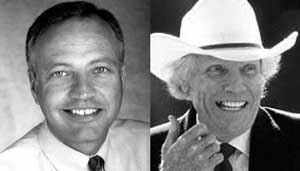-
- City Council approves transgender protections in preliminary vote
- Center to host monthly coalition building breakfasts
- GLBT Dems announce annual Pride reception
- San Diego to host international women’s event during Pride
- Mass commitment ceremony to be held at San Diego Pride festival, July 27
- Community News
-
- California domestic partners granted equal property tax rights
- Gay and lesbian protections sought in Phelps’ hometown
- Federal appeals court rules Connecticut can bar Scouts from charity list
- Supremes’ ruling on gay sex leaves Bush in ‘compassionate’ quandary
- Gay-straight alliance sues Texas school district
- Transgender man’s killer to remain on death row
- Gays seeking wedlock cautioned not to rush to Canada
- National News Briefs
- World News Briefs
national
Gay and lesbian protections sought in Phelps’ hometown
NGLTF gets behind grassroots effort to protect Topeka gays and lesbians
Published Thursday, 17-Jul-2003 in issue 812
TOPEKA, Kan. (AP) — Outsiders often assume the community of Topeka, Kansas, is a conservative place where social change occurs slowly.
After all, a Kansas law specifically criminalizing gay sex remained on the books this year, after most other states had repealed theirs. And among the Kansas capital’s 122,000 residents is the Rev. Fred Phelps, whose church has offended people across the nation with antigay pickets and signs with slogans like “God hates fags.
But Topeka also is home to activists seeking an ordinance that would protect gays and lesbians from discrimination.
The Topeka City Council narrowly rejected such a proposal last year, and a national group has made enacting an ordinance its priority. Activists, bolstered by a recent U.S. Supreme Court ruling that invalidated states laws against gay sex, plan to revive their proposal, perhaps this coming fall.
The activists face a reluctant council and more than a few Topeka residents who find the anti-gay picketing offensive but also view homosexuality as morally wrong. Yet supporters of a gay rights ordinance believe they can enact protections against discrimination.
“We think what is happening here in Topeka is incredibly important for our movement for equal rights across the country,” said Matt Foreman, executive director of the National Gay and Lesbian Task Force (NGLTF).
Talk of another attempt at enacting an ordinance does not surprise Dan Walker, spokesperson for the Family Action Network, a non-denominational group that opposes the idea. He said gays and lesbians are seeking special rights and are working toward legalizing gay marriages.
“The endgame in all of this is acceptance of homosexuality in Christianity,” Walker said. “That’s never going to happen. There’s always going to be a remnant that adheres to the Scriptures.”
The vote last September was 4-5 against an ordinance, described as an anti-discrimination or human rights proposal by its supporters and as a broad special rights enactment by opponents.
The ordinance’s sponsor, councilmember Lisa Hecht, lost her seat in an April municipal election, largely over that single issue. That dampened other council members’ interest in taking up the issue.
Councilmember Duane Pomeroy, who voted for the ordinance last year, said it polarized the community and recalled his advice to supporters: “Don’t bring it up unless you’re fairly confident you have the votes or can get the votes.”
A councilmember who voted no, Harold Lane, said he would not be surprised if the issue arose again but, “I haven’t heard anyone bring it up.”
That’s in sharp contrast to what Foreman and other activists say. Activists have started raising money and going door-to-door to build support; they hope a proposal will be introduced to the council in November.
The U.S. Supreme Court’s ruling June 26 in a Texas case, striking down that state’s anti-sodomy law, undercut one argument against the proposed Topeka ordinance, that the city should not extend protection to residents who are likely violating Kansas law. State officials said the court ruling invalidated the Kansas law as well.
Foreman had predicted the ruling before it occurred, seeing it as part of a trend of growing tolerance for GLBT citizens. He, like Topeka residents who back an ordinance, believes a majority support barring discrimination in housing and employment based on sexual orientation.
“Why should someone be discriminated against just because of who they are?” said Bill Beachy, spokesperson for Concerned Citizens of Topeka, a group formed by both gay and straight Topekans to answer the anti-gay picketing in the city.
Enacting an ordinance in Topeka might not be as important to the NGLTF were it not for Phelps.
For more than a dozen years, church members, many related to the pastor by blood or marriage, have picketed, becoming fixtures outside funerals for AIDS victims, venues for major events and other churches believed to be too quiet about “the sodomite agenda.”
Phelps’ church flies the American and Canadian flags upside down — the Canadian on top because of that nation’s acceptance of gay marriages.
And Phelps relishes another battle in Topeka, saying, “It’d just be fun.”
“They know that whatever they do, here we are, saying it is a monstrous sin in the face of God,” Phelps said.
Foreman said that some of his fellow activists outside Kansas assume that Phelps shows “nothing pro-gay can happen” in Topeka.
“We’re going to show it can — and will,” he said. “By winning in Topeka, it gets easier everywhere.”
|
|
Copyright © 2003-2025 Uptown Publications


